Like Mirror Twins. Propensity of Right-Wing and Left-Wing Bundestag MPs for Russian Narratives on War in Ukraine
TEXTY has analyzed the tweets on Ukraine send by the members of the German Bundestag from two opposition parties: the socialist Left (Die Linke) and the nationalist Alternative for Germany (AfD).
Читати українською
Lesen Sie diesen Artikel auf Deutsch
Many German MPs seem to agree on key Ukraine-related issues and use their public status to broadcast Russian propagandist narratives.
The politicians from the both parties have criticized the German federal government for supplying arms to Ukraine and imposing sanctions on Russia. Although their positions are remarkably similar, there are still some things that set them apart. It is the left-wing Die Linke who are the most passionate advocates of talks between Kyiv and Moscow.
In turn, the right-wing AfD exploit the subject of Ukrainian refugees and spread narratives which we identified as anti-Ukrainian. More detailed definitions are provided below.
Serhii Sumlennyi, the Director of European Resilience Initiative Center in Berlin, commented on the reason of this phenomenon. He believes that such unity stems from the anti-establishment stand of the both parties. Such anti-system parties as Die Linke and AfD unite their followers by claiming that the current government is concealing the truth and that NATO wages a global war against everything that is good, and, therefore, must be contained. An alliance with Putin fits into such a model perfectly as those parties agree with the Russian president who argues that Western democracies are mere imitations, and that Russia is there to offer an alternative approach which promises “the real truth and freedom”.
"Peace" and no weapons
Let us take a look at which members of the two parliamentary groups were the most active contributors of opinions on Ukraine.
Most of the AfD members (79% of Twitter account holders from the group) mentioned Ukraine in some way in their tweets.
The members of the other group, Die Linke, who tweeted on Ukraine were not as numerous — approximately 60%. However, those less numerous left-wing members contributed more than all their right-wing colleagues combined. Overall, it was Die Linke members that sent the largest number of tweets on Ukraine: 220 versus 170 from AfD.
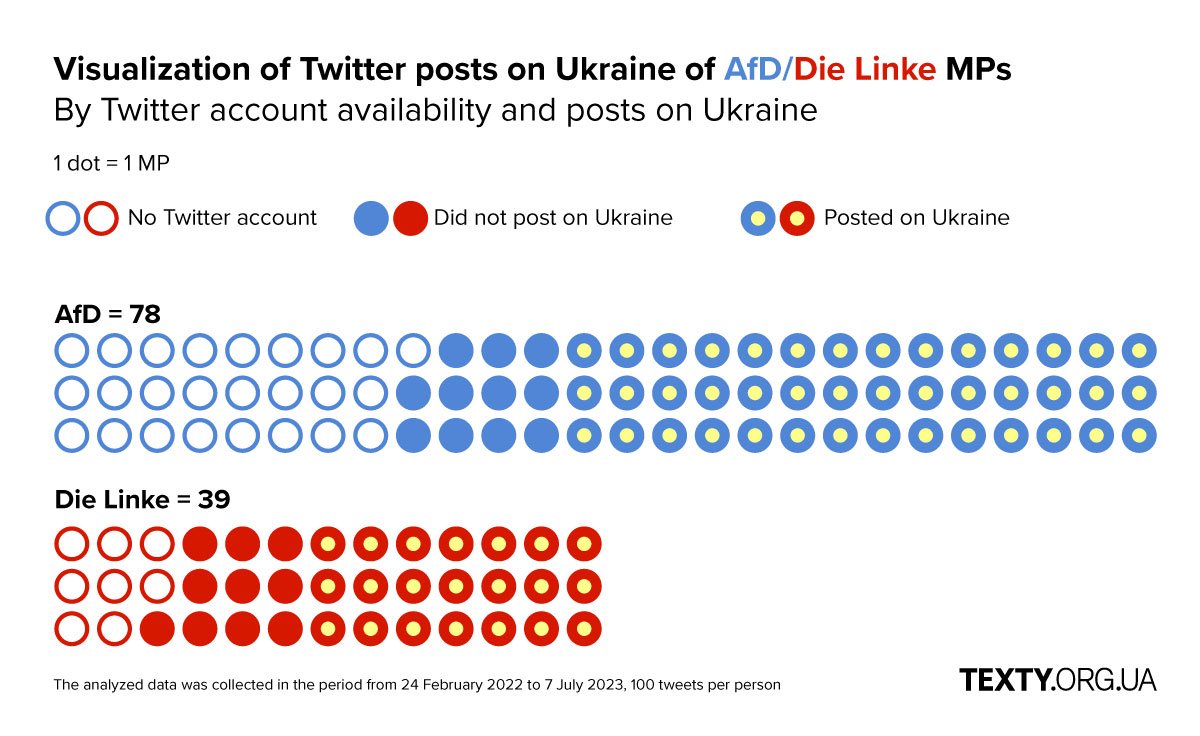
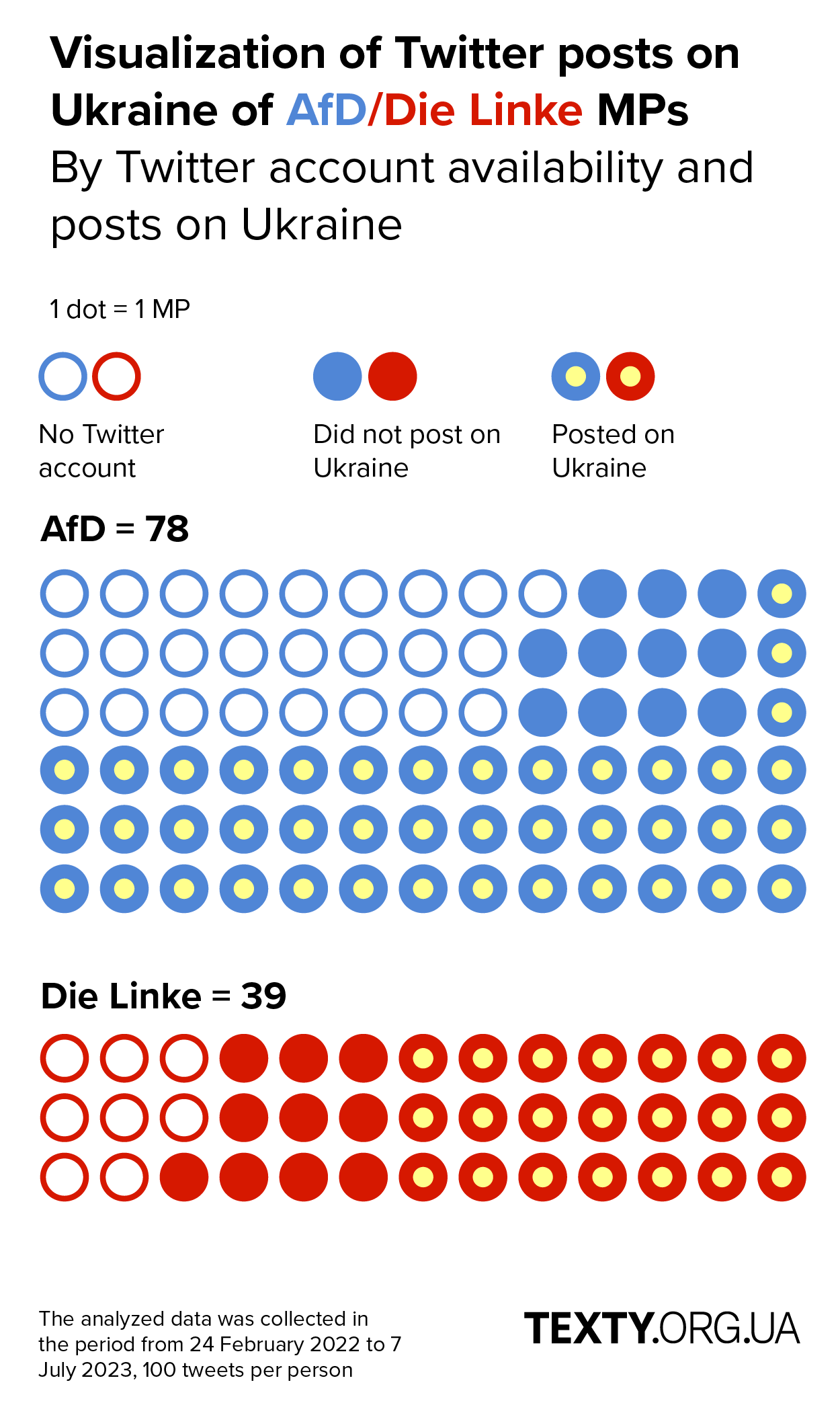
Having analyzed the content of the tweets, we have singled out seven categories of narratives regarding Ukraine:
⦁ Calls to halt military aid and arms supplies to Ukraine
⦁ Calls to initiate peace talks and calls to cease fire and resort to diplomacy with the aggressor
⦁ Anti-Ukrainian narratives such as calls to deny Ukraine NATO/EU membership, negative statements about Ukrainian refugees, criticism of the Ukrainian counteroffensive and blaming Ukraine for the decline of the level of wealth in Germany.
⦁ Pro-Russian narratives — i.e. statements which spread Russian propaganda on the blowing up of the gas pipelines in the North Sea and Kakhovska HPP, and shifting the blame for the war from Russia onto the West
⦁ Anti-sanctions narratives such as criticism of the anti-Russian economic sanctions
⦁ Calls to grant asylum to Russians such as calls to admit Russian citizens who are fleeing Russia to avoid the draft and support the performances of Russian cultural figures.
⦁ Criticism of the activities of the former Ukrainian ambassador to Germany Andrii Melnyk
The miscellaneous group “Mentions of Ukraine” includes messages which do not match any of the above categories.
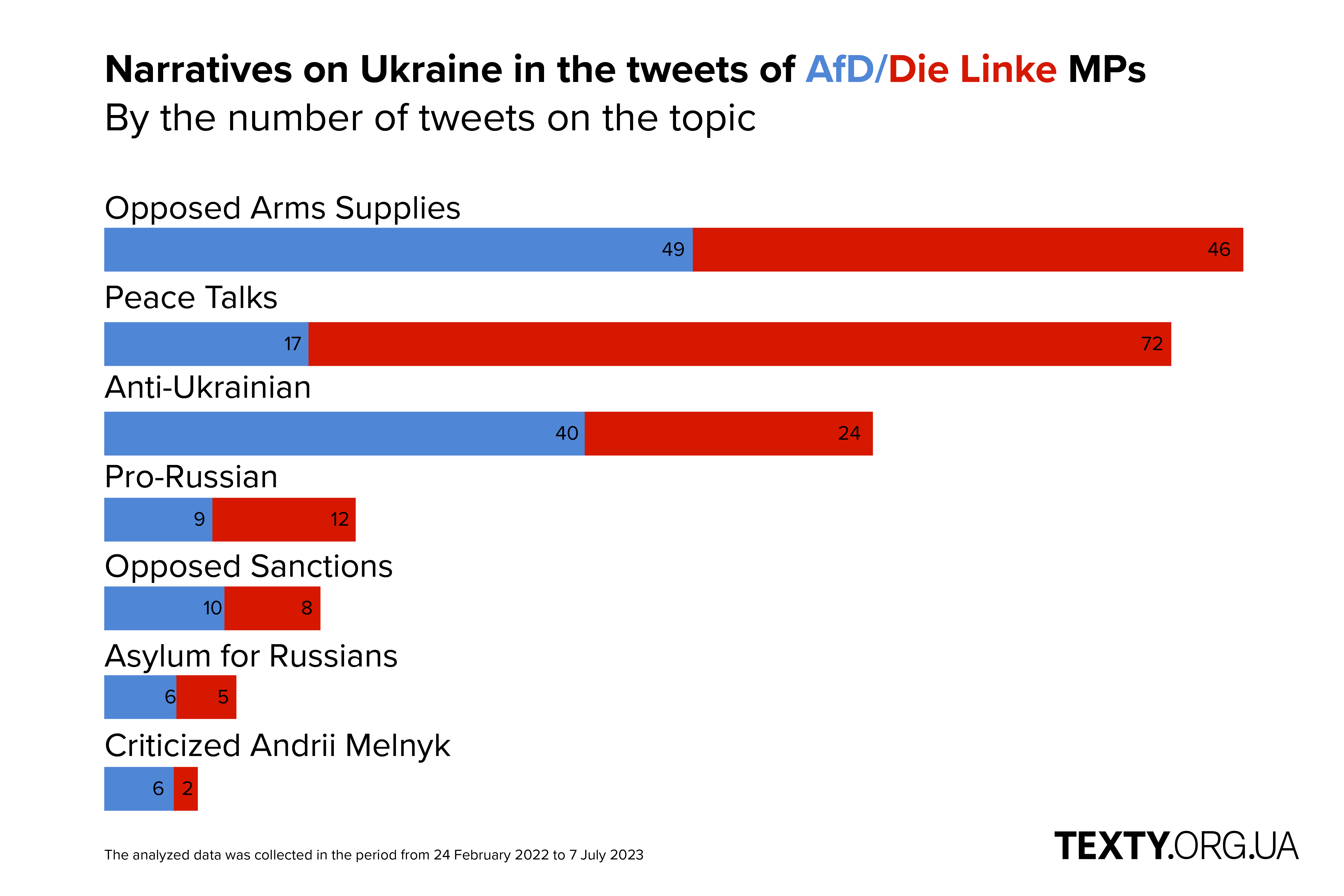
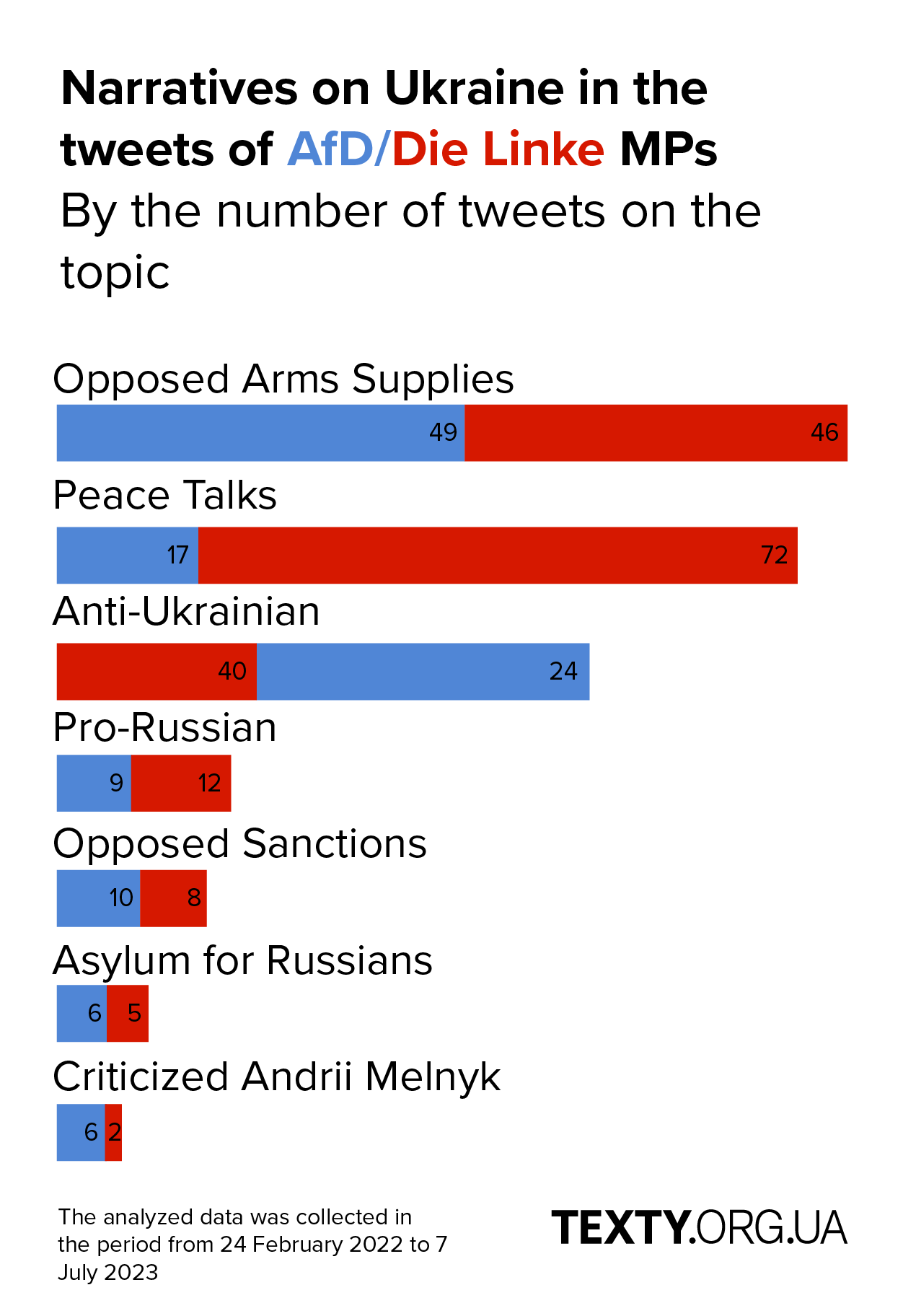
The most popular topics of the tweets posted by German MPs were calls to halt arms supplies to Ukraine and commence peace talks with Russia. Most of the tweets posted by the MPs followed those topics and resulted in the most active interaction with the social media users who liked, re-tweeted, and discussed the statements in the comments.
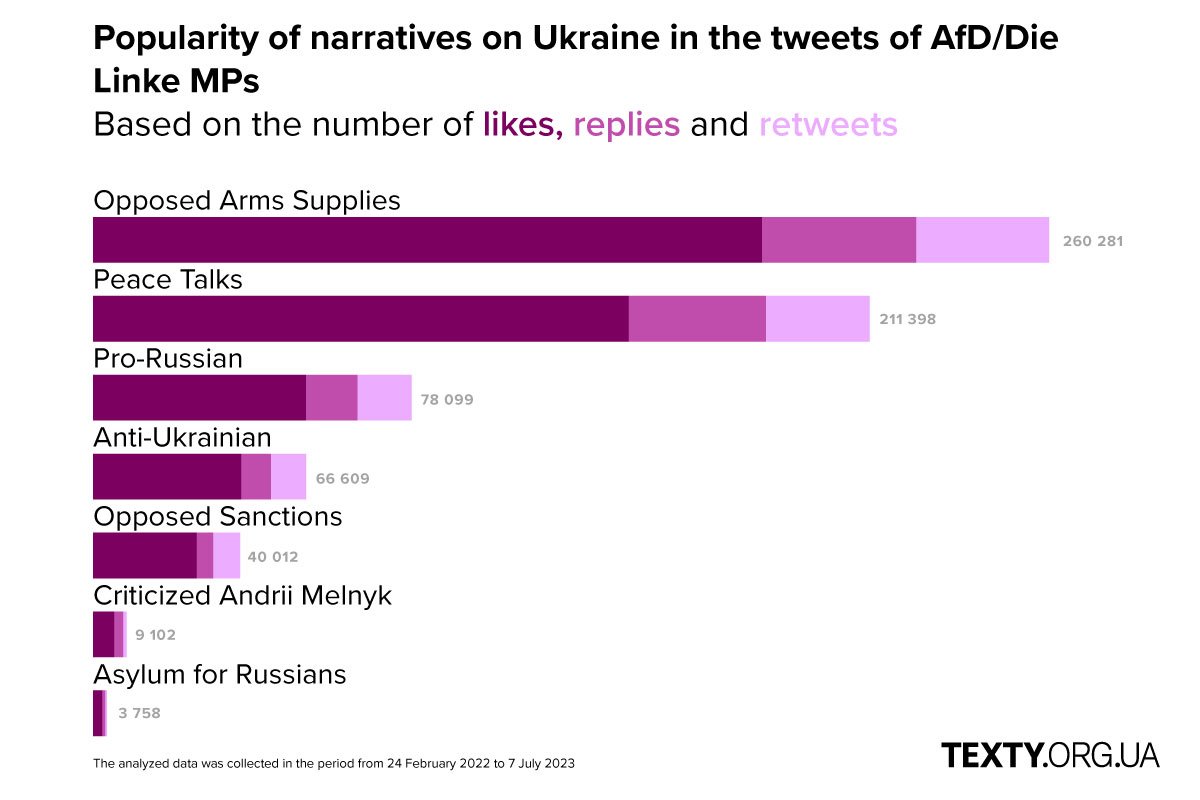
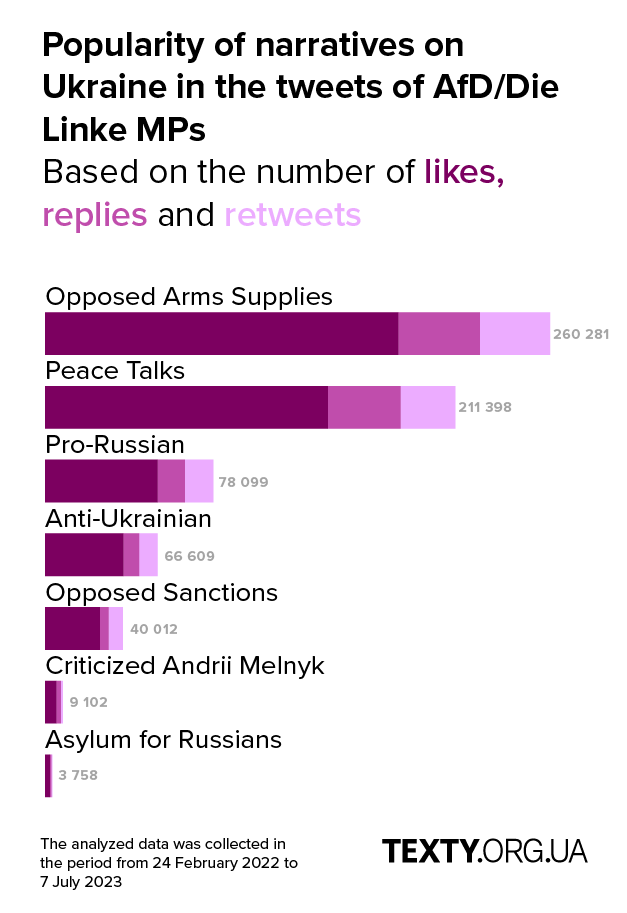
Both parties have criticized the German federal government for the decision to supply arms to Ukraine and have argued that the government must focus diplomacy and peace talks: “Today, the German Bundestag has approved a large-scale shipment of arms to Ukraine. Other parliamentary groups with the exception of the left-wing MPs, employed aggressive rhetoric. They must return to peace rhetoric! #niewiederkrieg”, wrote Karsten Hilse (AfD).
They assured that arms supplies only contribute to the risk of global escalation and the spread of war onto Western Europe and Germany in particular: “Most Germans are strongly against arms supplies, especially main battle tanks, to #Ukraine and not without reason since the potential of escalation has been unprecedented. We must do whatever it takes to prevent a war in the heart of Europe! #AfD”, tweeted Gerold Otten (AfD).
Coercion to initiating peace talks with the aggressor and seeking a diplomatic solution to the Russo-Ukrainian was another hot topic of the tweets: “Even the leading military experts agree that peace can only be reached at the negotiation table. The Federal Republic of Germany must stay committed to achieving cease fire and supporting the international peace initiative to finally put an end to this war”, wrote Amira Mohamed Ali (Die Linke).
Immediate negotiations with Russia
The left-wing MPs actively shared the “Manifesto for Peace” petition urging to sign it. The petition was a collaborative effort of the left-wing member of the German Bundestag Sahra Wagenknecht and journalist Alice Schwarzer: “This manifesto and the rally for peace are extremely important to defuse the atmosphere of military hysteria. After the end of the Cold War, the West started to violate international law”, wrote Gregor Gysi (Die Linke).
Sahra Wagenknecht is a German politician who is known for her sympathy for the Kremlin. In particular, she appealed for dissolving NATO and establishing a security alliance to include Russia. She also called for reinstating Russia as a "G7 member”.
Alice Schwarzer is the founder of EMMA magazine and a well-known German feminist. However, her recent rhetoric has been getting decidedly pro-Russian.
According to Deutsche Welle, a number of German media referred to the petition, in which the authors had called for immediate negotiations with Russia claiming that Ukraine “does not stand a fighting chance against the world's largest nuclear power”, a “Manifesto for Obedience”.
Among all the German MPs who were active on Twitter, Sahra Wagenknecht was by far the most prolific (44%) in terms of posting on Ukraine. She uses her Twitter page to rally support of her manifesto and call on Ukraine to engage in peace talks. The MP also vehemently opposes the supplies of ammunition, fighter planes and tanks to Ukraine.
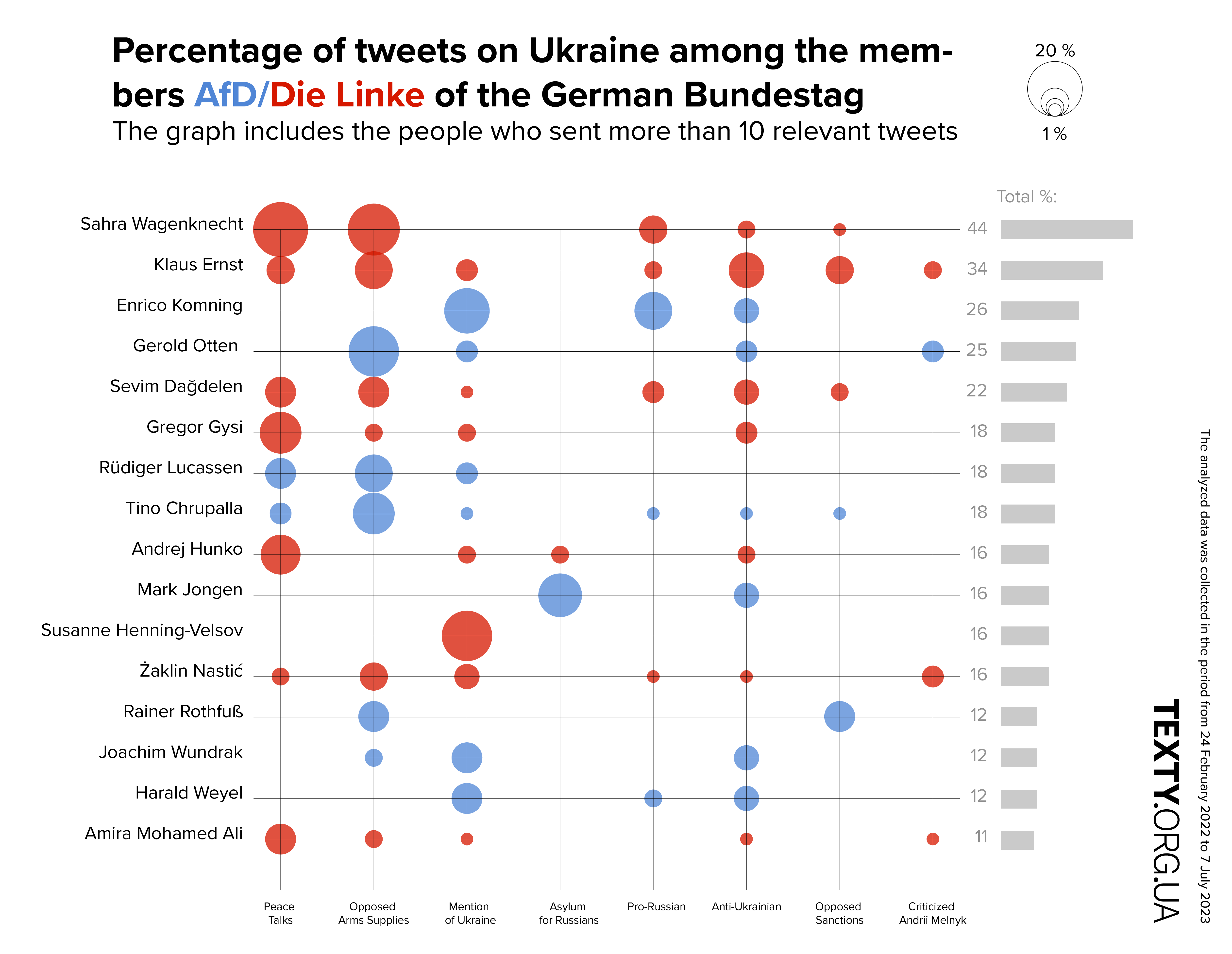
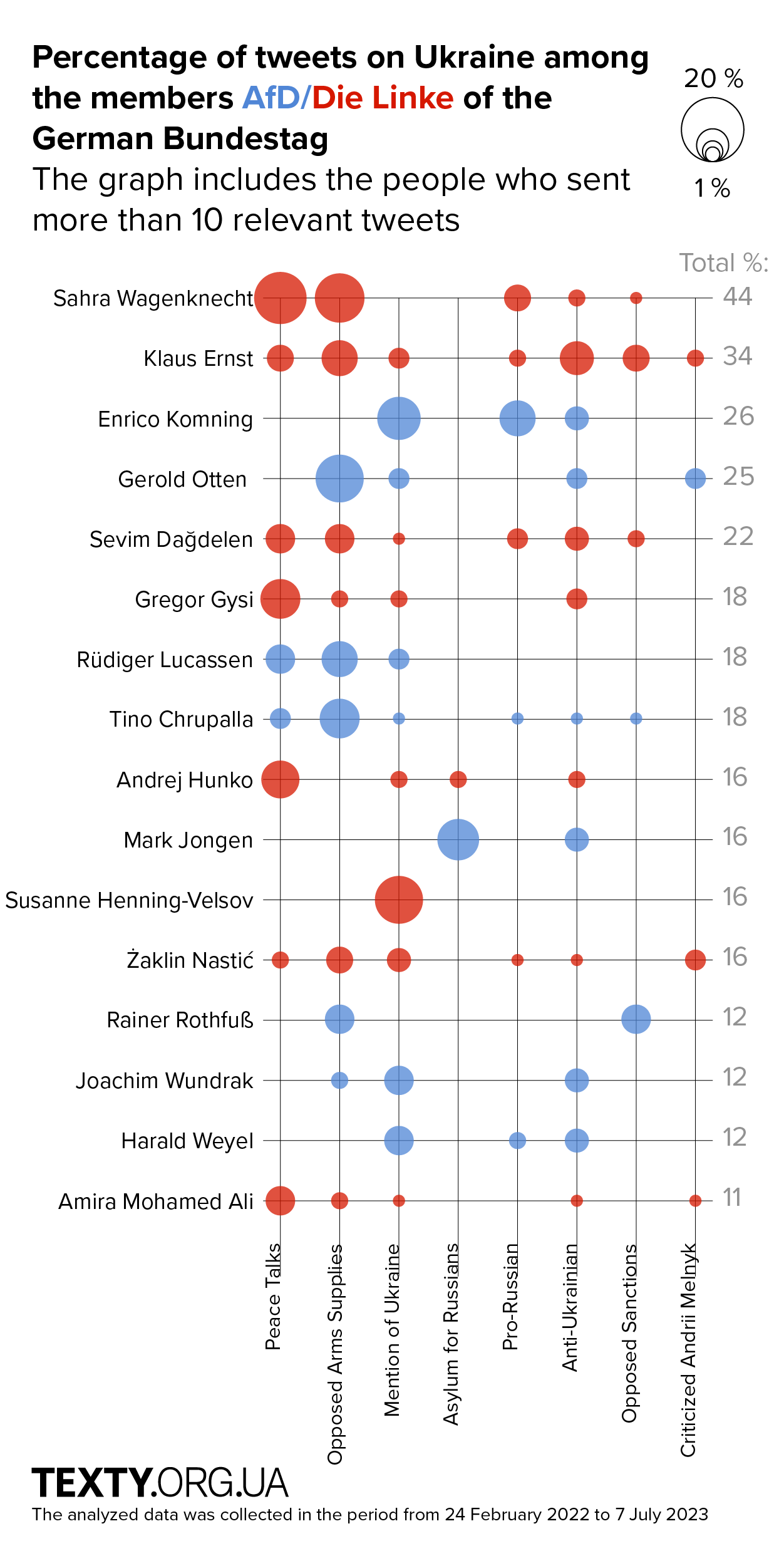
According to Ms Wagenknecht, it is the West that is to blame for the ongoing war in Ukraine — not the Russian troops on Ukrainian soil. In her opinion, expecting the Russian army to withdraw from Ukraine is futile — therefore, Ukraine and its allies must accept the fact that such expectations are absolutely unrealistic: “Yesterday, I attended #HartAberFair: Those who agree to negotiate with Russia only after the last Russian has left Crimea must admit support of further escalation and many more years of war to claim countless victims and eventually wipe Ukraine off the map" (the link is here but the article is already deleted).
Furthermore, the MP supported the Russian propagandist narrative by blaming Ukraine for the blowing up of the Nord Stream gas pipelines: “ARD, ZEIT, SWR have confirmed the facts published by Washington Post: The German government was aware of the attacks on Nord Stream which had been planned by Ukraine. Why didn't they prevent the attacks by taking the appropriate measures?”
This narrative was spread by another active Twitter user Klaus Ernst who is a member of The Left party: “According to Washington Post, the attacks were carried out by a Ukrainian national. It was Ukrainian commandos that destroyed the pipelines of Nord Stream 1 and 2. The CIA had been warned at an early stage of the operation. This explains why the German government wanted to bury the facts. It was a hostile act of Ukraine against Germany. The sentiment may change”.
At the same time, Ernst opposed the supplies of arms to Ukraine and the anti-Russian sanctions. He urged Ukraine to commence peace talks immediately and criticized the Ukrainian government and Ukrainians in general: “Zelenskyy is obviously pushing us into a nuclear war. Such behavior is absolutely irresponsible. It is the Russians who are the bad guys in this war, but this fact does not mean that the Ukrainians are the good guys here”.
The “Asylum for Russians”
The “Asylum for Russians” narrative was most actively pushed by Mark Jongen of AfD and Jan Korte of The Left.
Mr Jongen claimed art to be beyond politics and spread the call “No #Sippenhaft for Russian artists!...” through his Twitter account. The term "Sippenhaft" means “collective responsibility”. Such was his reaction to the events of 2 March 2022 when the mayor of Munich removed Russian citizen Valery Gergiev from the post of the chief conductor of the Munich Philharmonic after his refusal to denounce Putin’s invasion of Ukraine, and fired the Russian diva Anna Netrebko, also a citizen of the aggressor state.
In turn, Mr Korte fired broadsides at the German government for doing too little to support Russian draft dodgers and called to provide them with more opportunities of finding asylum in Germany: “I find it cynical that the German federal government @spdde, @Die_Gruenen and @fdp is destroying Putin's army by supplying arms, but refuses to offer asylum to deserters who do not want to join the Russian army for reasons of conscience. Did somebody forget their promises made in September of 2022?”
Trouble for Ukraine
According to the results of Deutschlandtrend survey published at the end of June, “Alternative for Germany” (AfD) had become more popular: 19 percent of the German voters said they would choose it among others.
If the election to the German Bundestag had been held at the end of June, the right-wing populists would have come second getting ahead of the social-democrats (17%), The Greens (15%) and the free democrats (6%) which constitute the current ruling coalition.
The strengthening and widespread representation of this populist party which broadcasts pro-Kremlin narratives would negatively affect Ukraine's position in Europe and could undermine Europe's support of Kyiv
The left-wing flank is also getting stronger. In the middle of the summer the board of the Left Party (Die Linke) decided to finally part ways with Sahra Wagenknecht, the undisputed star of the party. According to our study, she was the MP with the highest percentage (44%) of tweets dedicated to Ukraine among all her posts that we had analyzed. Today, Wagenknecht is by far the most famous and popular figure in Die Linke compared to the other members of her party. Her future looks bright as she is getting more and more popular. According to the poll held by Kantar sociological institute in the spring of 2023, if Sarah Wagenknecht had created her own party during the representative survey, 19% of the respondents would have voted for the new political project.
Hypothetically, it might become Germany's new political party with an agenda built on reconciliation and friendship with Russia.
The Methodology
The data for the analysis were downloaded in the period from 24 February 2022 to 7 July 2023, 100 messages for each person. For the especially active Twitters, the last one hundred messages were considered.
Overall, we analyzed over 7,000 tweets and retweets of which 5% pertained to Ukraine. Our attention was focused on 84 MPs since the other 33 members of the German Bundestag either did not have Twitter accounts, did not state them on the official website of the institution, or their last tweet predated 24 February 2022.
To identify the relevant posts — i.e. whose content was related to Ukraine, BERTopic topic modeling and ChatGPT as well as key word searching methods were used. And, finally, once the tweets had been translated into Ukrainian with DeepL, the resulting posts were subjected to manual validation and content analysis.

